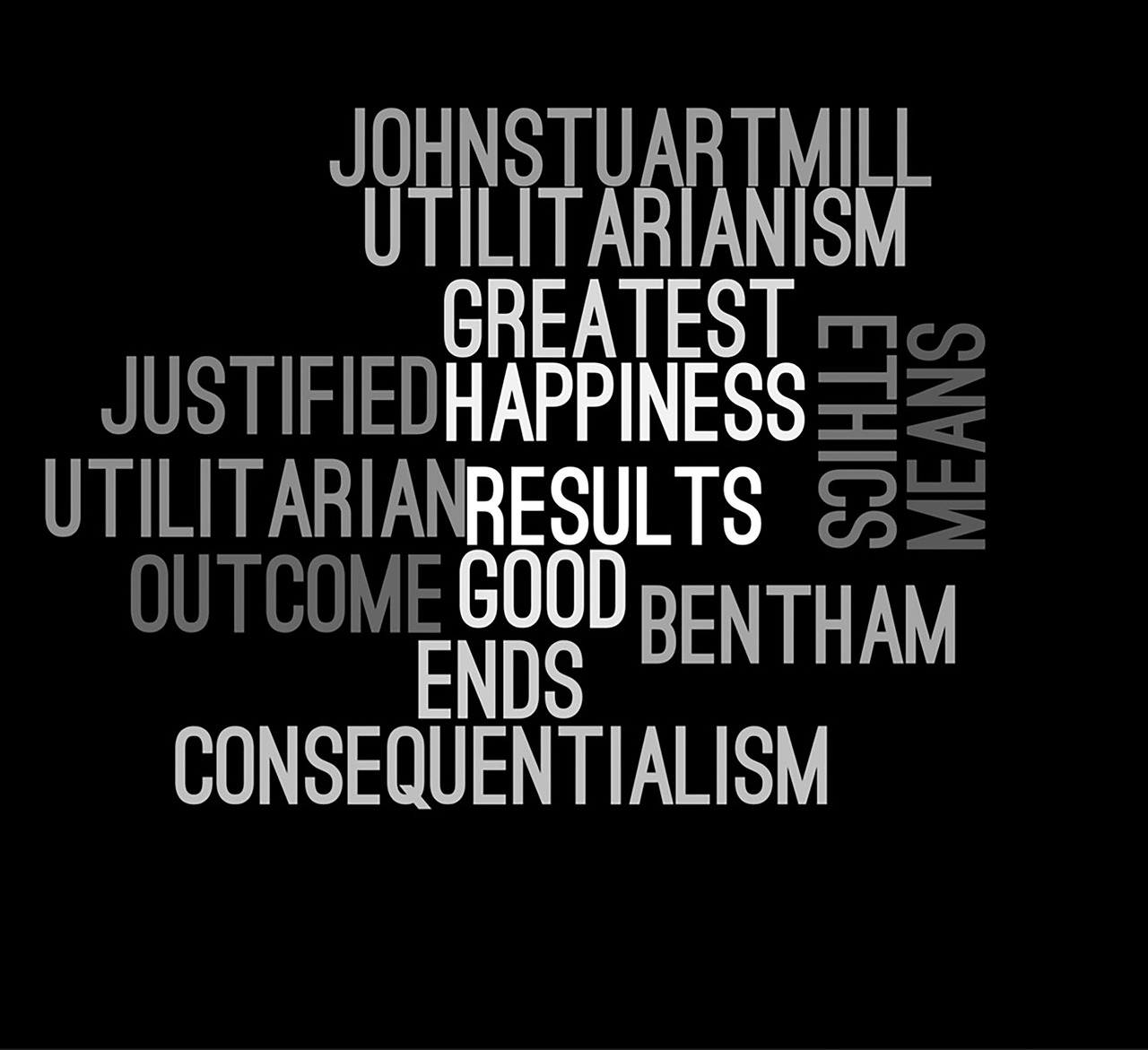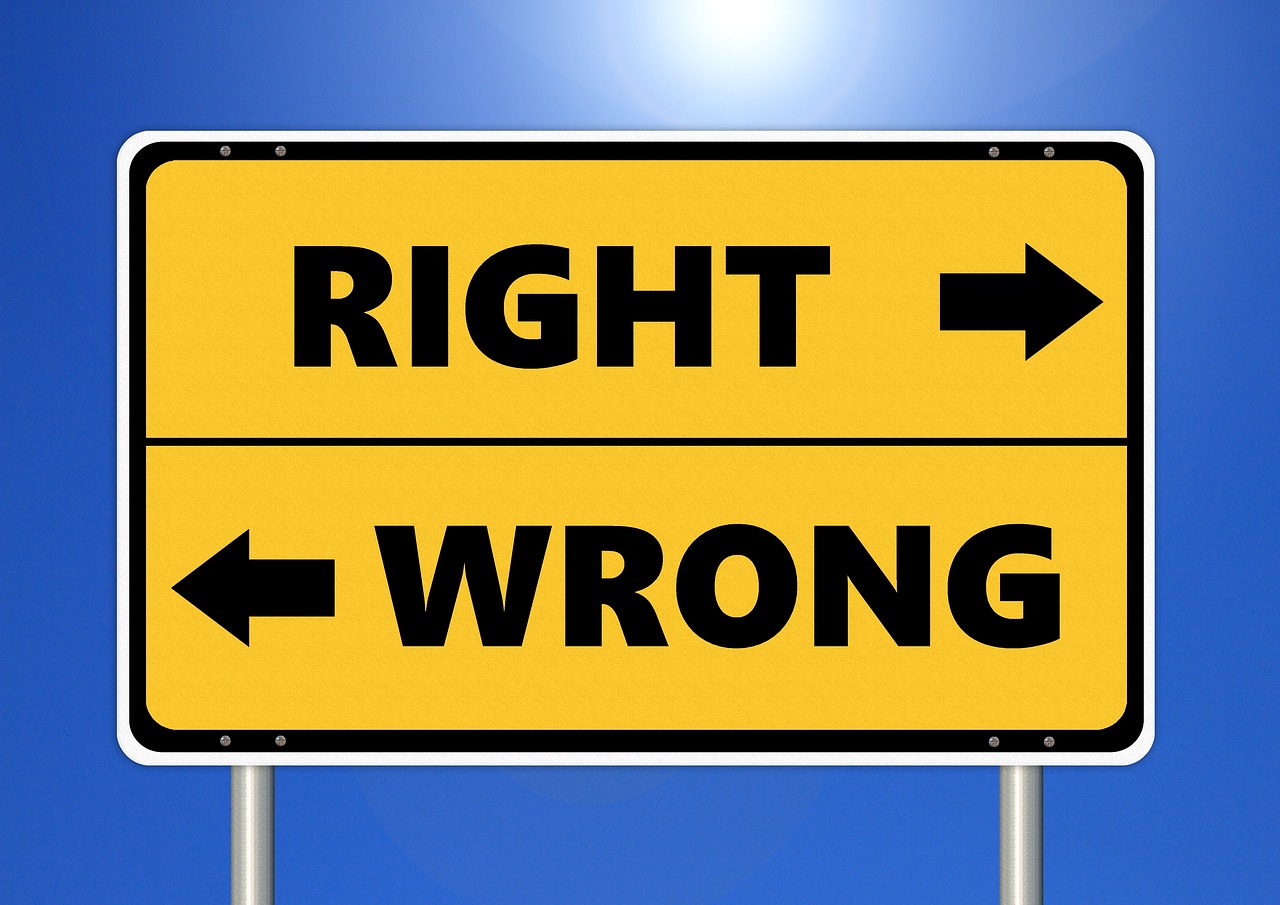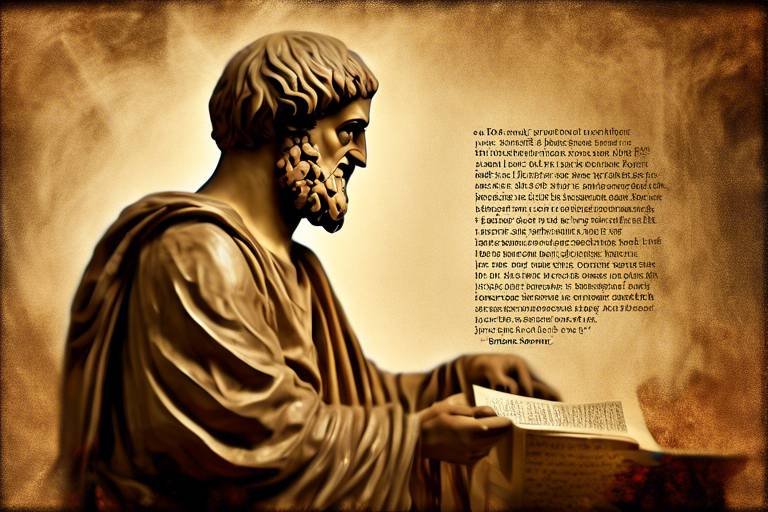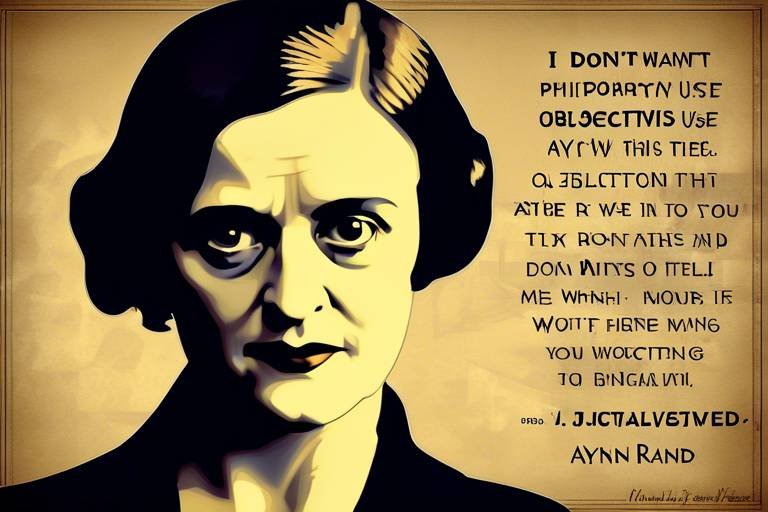Comparing the Philosophies of Kant and Mill on Ethics and Justice
This article explores the contrasting ethical theories of Immanuel Kant and John Stuart Mill, focusing on their views on justice, morality, and the implications of their philosophies in contemporary society. Both philosophers have left a profound impact on ethical theory, yet their approaches diverge significantly. Kant's deontological ethics stresses the importance of duty and adherence to moral laws, while Mill's utilitarianism emphasizes the outcomes of actions in terms of happiness and suffering. In this exploration, we will delve into the core tenets of each philosopher's views on ethics and justice, revealing how their ideas continue to shape our understanding of morality today.
Kant's ethical framework emphasizes duty and the moral law, asserting that actions are morally right based on adherence to rules rather than consequences. This means that, for Kant, the intention behind an action is what matters most. He believed that moral actions stem from a sense of duty and that individuals should act according to maxims that can be universally applied. This deontological approach sets a strong foundation for ethical reasoning, where the morality of an action is judged based on whether it aligns with a universal moral law.
Utilitarianism, as proposed by Mill, advocates for actions that maximize happiness and minimize suffering. This philosophy evaluates the morality of actions based on their consequences, suggesting that the best action is the one that produces the greatest good for the greatest number. Mill's approach is practical and flexible, allowing for a consideration of the broader societal impacts of individual actions. By focusing on the outcomes, Mill's utilitarianism provides a framework for ethical decision-making that resonates with many contemporary issues, from public policy to personal choices.
Kant introduced the Categorical Imperative as a central concept in his ethics, outlining a universal moral law that applies to all rational beings. It serves as a guideline for determining what actions are morally permissible. The Categorical Imperative can be summarized in a few key formulations, such as: act only according to that maxim whereby you can at the same time will that it should become a universal law. This principle is significant because it compels individuals to consider the broader implications of their actions, ensuring that they act in ways that could be accepted as universal laws.
The principle of universalizability is crucial to Kant's ethics, suggesting that one should act only according to maxims that can be universally applied. This means that if you believe it is acceptable to lie in a certain situation, you must also accept that lying should be acceptable for everyone in similar situations. This principle helps maintain consistency in moral reasoning and encourages individuals to consider the implications of their actions on a universal scale.
Kant's emphasis on treating individuals as ends in themselves rather than means to an end highlights a fundamental aspect of his moral philosophy. This respect for human dignity asserts that every person has intrinsic worth and should be treated accordingly. It challenges us to consider how our actions affect others, promoting a moral landscape where individuals are valued and respected, regardless of their utility to others.
Mill's consequentialist approach evaluates the morality of actions based on their outcomes. This perspective shapes ethical considerations and societal norms by prioritizing the results of actions over the actions themselves. For Mill, the rightness or wrongness of an action is determined by its contribution to overall happiness. This pragmatic approach allows for a more flexible understanding of ethics, adapting to the complexities of real-life situations.
Kant's view of justice is rooted in fairness and equality, emphasizing the importance of moral rights. He believed that justice must be grounded in the moral law and that individuals should be treated with respect and dignity. This ethical framework informs concepts of justice and legal systems, advocating for a legal structure that upholds moral rights and ensures fair treatment for all individuals.
Kant advocates for retributive justice, arguing that punishment should be proportionate to the crime. This means that justice is served when individuals receive consequences that reflect the severity of their actions. Kant's perspective on justice emphasizes accountability and the idea that individuals must face the repercussions of their choices, reinforcing the moral order within society.
Kant's philosophy links justice to individual autonomy, asserting that moral agents must be free to make choices. This autonomy is crucial for moral responsibility, as it allows individuals to act according to their rational will. In Kantian ethics, justice is not merely about enforcing laws; it is about respecting the capacity of individuals to make their own decisions and holding them accountable for those decisions.
Mill's perspective on justice is intertwined with the greater good, focusing on societal welfare. In this framework, justice is not an isolated concept but is deeply connected to the overall happiness of society. Mill argues that policies and actions should be evaluated based on their ability to enhance the collective well-being of the community. This utilitarian approach encourages a broader understanding of justice, where the focus is on outcomes that benefit the majority.
Utilitarianism promotes social justice by advocating for policies that enhance overall happiness. Mill's philosophy supports initiatives that aim to reduce suffering and promote well-being for all, which is particularly relevant in discussions about social equity and welfare today. By prioritizing the happiness of the majority, Mill's ideas have influenced modern social justice movements, encouraging a focus on collective welfare and the elimination of inequalities.
Despite its appeal, Mill's utilitarianism faces critiques regarding potential injustices in prioritizing the majority's happiness. Critics argue that this approach can lead to the marginalization of minority groups, as their suffering may be overlooked in favor of the greater good. This raises important questions about the ethical implications of utilitarianism and its application in real-world scenarios. Balancing the needs of the majority with the rights of individuals remains a complex challenge in contemporary ethical discussions.
- What is the main difference between Kant's and Mill's ethical theories?
Kant's theory is deontological, focusing on the morality of actions based on adherence to rules, while Mill's is consequentialist, emphasizing the outcomes of actions in terms of happiness. - How does Kant's concept of justice differ from Mill's?
Kantian justice is based on fairness and moral rights, while Millian justice is centered around the greatest happiness for the greatest number. - Can utilitarianism lead to unjust outcomes?
Yes, critics argue that utilitarianism can result in injustices, particularly for minority groups whose suffering may be overlooked in favor of majority happiness.

Kant's Deontological Ethics
When we dive into the world of , we encounter a framework that places immense value on duty and the moral law. Unlike many ethical theories that focus on the consequences of actions, Kant argues that the morality of an action is determined by its adherence to a set of rules. Imagine a world where every action is judged not by its outcome, but by the intention behind it. This is the essence of Kantian ethics, where the moral worth of an action is rooted in the principle of duty.
Central to Kant's philosophy is the idea that humans are rational beings capable of making moral decisions. He believed that our ability to reason allows us to discern right from wrong, and this reasoning should guide our actions. For Kant, the ultimate goal is to act in accordance with a moral law that is universal and applicable to all rational beings. This leads us to the concept of the Categorical Imperative, which serves as a foundational principle in his ethical framework.
The Categorical Imperative can be summarized in a few key formulations:
- Universal Law: Act only according to that maxim whereby you can, at the same time, will that it should become a universal law.
- Humanity: Act in such a way that you treat humanity, whether in your own person or in the person of any other, always at the same time as an end and never merely as a means to an end.
- Autonomy: Act only so that your will can regard itself at the same time as making universal law through its maxims.
These formulations collectively emphasize the importance of universalizability and respect for individuals. The principle of universalizability suggests that we should only act in ways that we would want everyone else to act. This notion creates a moral standard that transcends personal desires and situational contexts, urging us to consider the broader implications of our actions.
Furthermore, Kant's emphasis on treating individuals as ends in themselves rather than means to an end showcases his commitment to human dignity. He believed that every person has intrinsic worth and should never be exploited for the benefit of others. This respect for persons is a cornerstone of his ethical philosophy, influencing various aspects of contemporary moral thought, including human rights and social justice.
In summary, Kant's deontological ethics provides a robust framework for understanding morality through the lens of duty and rationality. It challenges us to think beyond the immediate consequences of our actions and to consider the moral laws that govern our behavior. By adhering to Kantian principles, we can cultivate a sense of responsibility and integrity in our ethical decision-making.

Mill's Utilitarianism
John Stuart Mill's philosophy of utilitarianism stands out as a beacon of moral reasoning in the complex landscape of ethics. At its core, utilitarianism champions the idea that the best action is the one that maximizes overall happiness and minimizes suffering. Imagine a world where every decision we make contributes to the greater good—this is the vision Mill presents. But how does this translate into real-life ethical decision-making?
Utilitarianism operates on a simple yet profound principle: the greatest happiness principle. This principle asserts that actions are right if they promote happiness and wrong if they produce the opposite. Mill's approach is consequentialist, meaning that the morality of an action is judged solely by its outcomes. This leads us to consider not just our actions, but the ripple effects they create in the lives of others. For example, if a policy decision leads to increased happiness for the majority, it is deemed morally acceptable, even if it may cause some distress to a minority. This raises an intriguing question: can the happiness of the few be sacrificed for the happiness of the many?
To better understand Mill's utilitarianism, let's break down its fundamental aspects:
- Happiness as the Ultimate Goal: Mill argues that happiness is the ultimate end of human action, and thus, all ethical considerations should revolve around the pursuit of happiness.
- Quality vs. Quantity of Happiness: Unlike Jeremy Bentham, who focused on the quantity of pleasure, Mill emphasized the quality of pleasures. He believed that some pleasures, such as intellectual and moral pleasures, are superior to others.
- Impartiality: Utilitarianism requires an impartial consideration of everyone's happiness, ensuring that no individual's well-being is prioritized over another's.
In practical terms, Mill's utilitarianism has profound implications for ethical decision-making. For instance, in public policy, lawmakers often grapple with utilitarian principles when crafting laws. They must weigh the potential benefits of a new policy against the possible harms it may inflict on certain groups. This balancing act requires a deep understanding of the consequences of actions, which can sometimes be challenging to predict.
Moreover, Mill's philosophy encourages a forward-thinking approach to ethics. It asks us to consider the long-term effects of our actions, pushing us to think beyond immediate gratification. In a world that often prioritizes short-term results, this perspective can be revolutionary. By focusing on the long-term happiness of society, we can foster a more just and equitable world.
However, Mill's utilitarianism is not without its critics. Some argue that it can lead to morally questionable decisions if the majority's happiness is prioritized at the expense of the minority. For example, if a community decides to impose restrictions that benefit the majority but severely impact a minority group, is that truly ethical? This dilemma highlights the tension between utilitarianism and the need for justice and individual rights.
In summary, Mill's utilitarianism offers a compelling framework for understanding ethics through the lens of happiness and consequences. It challenges us to consider our actions' broader impact and encourages a more compassionate approach to moral reasoning. Yet, as we navigate the complexities of ethical decision-making, we must remain vigilant about the potential pitfalls of prioritizing the majority's happiness over the dignity and rights of individuals.
- What is the main idea behind Mill's utilitarianism?
Mill's utilitarianism posits that the best action is one that maximizes happiness and minimizes suffering for the greatest number of people. - How does Mill differentiate between types of happiness?
Mill emphasizes the quality of pleasures, arguing that intellectual and moral pleasures are superior to mere physical pleasures. - What are the criticisms of utilitarianism?
Critics argue that utilitarianism can justify actions that harm minorities if such actions benefit the majority, raising questions about justice and individual rights.

The Categorical Imperative
The Categorical Imperative is arguably the cornerstone of Immanuel Kant's ethical philosophy. It serves as a universal moral law that dictates how we ought to act, regardless of our desires or the consequences of our actions. To put it simply, it's like a compass guiding us through the murky waters of moral dilemmas. But what exactly does it entail? Let's break it down.
Kant proposed that moral actions should be governed by maxims that can be universally applied. In other words, if you’re considering an action, ask yourself: "Would I want everyone else to act in the same way?" If the answer is yes, then the action is morally permissible. This leads us to the principle of universalizability, which is crucial in Kant's ethical framework. It emphasizes that our personal rules for behavior should be applicable to everyone, not just to ourselves. Imagine if everyone acted on the same principles you do—would that create a harmonious society or chaos? This thought experiment is a powerful tool for ethical reasoning.
Another vital aspect of the Categorical Imperative is the idea of respect for persons. Kant believed that every individual should be treated as an end in themselves, not merely as a means to an end. This means we must acknowledge the inherent worth and dignity of every person. Think about it: when you use someone for your own gain without considering their feelings or rights, you’re undermining their value as a human being. By adhering to the Categorical Imperative, we foster a sense of moral responsibility that champions human dignity and equality.
To illustrate the Categorical Imperative, let’s consider a practical example. Imagine a scenario where you find a wallet on the street. According to Kant, you should not keep it for yourself because you wouldn’t want everyone to act in the same selfish manner. Instead, the moral course of action is to return the wallet to its rightful owner. This act not only respects the owner’s rights but also reinforces the idea that we should treat others as we wish to be treated.
In summary, the Categorical Imperative is a profound concept that challenges us to think beyond our immediate desires and consider the broader implications of our actions. By applying this ethical framework, we can navigate complex moral landscapes, ensuring that our choices reflect a commitment to universal moral laws and respect for all individuals. This approach not only shapes personal ethics but also has profound implications for societal norms and justice.
- What is the Categorical Imperative?
The Categorical Imperative is a foundational principle in Kant's moral philosophy, stating that one should act only according to maxims that can be universally applied. - How does the Categorical Imperative differ from hypothetical imperatives?
While hypothetical imperatives are conditional and depend on personal desires, the Categorical Imperative is unconditional and applies to all rational beings. - Can the Categorical Imperative provide clear guidance in all ethical dilemmas?
While it offers a robust framework, real-life situations can be complex, and applying the Categorical Imperative requires careful consideration of context.

Universalizability Principle
The is a cornerstone of Kant's deontological ethics, serving as a litmus test for the morality of actions. Essentially, it posits that one should only act according to maxims that can be universally applied. Imagine if every action you took became a universal law; would the world be a better place or a chaotic one? This principle invites us to consider the broader implications of our actions beyond our immediate context. It challenges us to think critically about whether our personal choices could be adopted by everyone without leading to contradictions or moral dilemmas.
To illustrate this principle, consider the following scenario: if someone believes it's acceptable to lie in order to avoid hurting someone’s feelings, they must ask themselves: What if everyone lied in similar situations? Would trust still exist? Would relationships flourish? This reflection emphasizes the importance of consistency in moral reasoning. If a maxim cannot be universally applied without leading to a contradiction, then it fails the test of morality according to Kant.
Furthermore, the Universalizability Principle underscores the significance of rationality in ethical decision-making. Kant argues that moral agents are rational beings capable of discerning right from wrong. Therefore, when we formulate our maxims, we should do so with the understanding that our reasoning must be grounded in principles that everyone could, in theory, endorse. This rational basis is what separates mere personal preference from genuine moral law.
In practical terms, the Universalizability Principle can be applied in various contexts, from personal dilemmas to societal laws. For instance, when lawmakers draft legislation, they should consider whether the laws they propose could be accepted as universal. Would it be justifiable for everyone to act under these laws? If the answer is no, then the legislation may need to be reconsidered. This principle serves as a guide not only for individuals but also for institutions, reminding us of our collective responsibility to uphold ethical standards that promote fairness and justice.
In summary, the Universalizability Principle is not just an abstract concept; it is a practical tool for ethical reasoning. By urging us to consider the universality of our maxims, it fosters a deeper understanding of morality that transcends individual circumstances. It challenges us to think about the kind of world we want to create and the values we wish to uphold.
- What is the Universalizability Principle?
The Universalizability Principle is a key concept in Kantian ethics that suggests one should only act according to maxims that can be universally applied.
- How does this principle affect moral decision-making?
This principle encourages individuals to consider the broader implications of their actions and whether those actions could be accepted as universal laws.
- Can you provide an example of the Universalizability Principle in action?
Sure! If someone thinks it’s acceptable to cheat on a test, they should ask themselves if it would be okay for everyone to cheat. If not, their reasoning fails the test of morality.

Respect for Persons
Kant's ethical philosophy places a profound emphasis on the concept of , which is a cornerstone of his moral framework. At its core, this principle asserts that every individual possesses inherent dignity and should never be treated merely as a means to an end. Instead, each person is an end in themselves, deserving of consideration and respect. This idea challenges us to reflect on our interactions with others, urging us to recognize their value beyond their utility to us. Imagine treating people like tools—useful only when they serve a purpose. Kant would argue that this not only dehumanizes individuals but also undermines the moral fabric of society.
Moreover, Kant's insistence on respecting persons is intricately linked to his notion of moral autonomy. He believed that individuals have the capacity to govern themselves and make rational decisions. By respecting others, we acknowledge their ability to make choices and their right to pursue their own goals. This respect is not just a passive acknowledgment; it requires active engagement and a commitment to uphold the rights and freedoms of others. For instance, when we advocate for social justice or stand against discrimination, we are embodying Kant's call to respect individuals as autonomous agents.
To illustrate the implications of this principle, consider the following scenarios:
- In the workplace: Respecting colleagues means valuing their opinions and contributions, regardless of their position or status. It fosters a culture of collaboration and innovation.
- In personal relationships: Treating friends and family with respect involves listening to their needs and supporting their choices, even when they differ from our own.
- In society: Advocating for the rights of marginalized groups exemplifies respect for persons, as it recognizes their dignity and worth as individuals.
Ultimately, the principle of respect for persons serves as a guiding light in ethical decision-making. It compels us to ask ourselves whether our actions uphold the dignity of others. Are we treating people fairly? Are we considering their perspectives and experiences? By embracing this principle, we contribute to a more just and equitable world, where every individual is valued and treated with the respect they inherently deserve.
- What does Kant mean by "respect for persons"? Kant's concept of respect for persons emphasizes the inherent dignity of every individual, advocating that people should never be treated merely as means to an end.
- How does respect for persons relate to justice? Respect for persons is foundational to justice, as it ensures that individuals are treated fairly and their rights are upheld.
- Can respect for persons be applied in everyday life? Absolutely! Respect for persons can be practiced in various contexts, including personal relationships, workplaces, and community interactions.

Consequentialism in Mill's Philosophy
John Stuart Mill's ethical framework is primarily rooted in consequentialism, which posits that the morality of an action is determined by its outcomes. In simpler terms, Mill believed that the rightness or wrongness of actions hinges on their ability to produce the greatest good for the greatest number. This idea, often encapsulated in the phrase "the greatest happiness principle," serves as a cornerstone of Mill's utilitarianism. But what does this mean for everyday decision-making? Essentially, it encourages individuals to weigh the potential benefits and harms of their actions, striving to maximize overall happiness while minimizing suffering.
Mill's approach diverges sharply from more rigid ethical theories, such as those proposed by Kant. While Kant emphasizes adherence to moral rules regardless of the consequences, Mill's philosophy invites a more flexible, outcome-oriented perspective. Imagine you're at a crossroads, faced with a decision that could impact many lives. According to Mill, you would evaluate the potential outcomes of each choice and select the one that maximizes happiness. This pragmatic approach allows for a more nuanced understanding of morality, one that considers the complexities of human experience.
A key aspect of Mill's consequentialism is the evaluation of happiness itself. But how do we measure happiness? Mill recognized that not all pleasures are created equal. He famously distinguished between higher and lower pleasures, suggesting that intellectual and moral pleasures are superior to mere physical gratification. This hierarchy implies that actions leading to the cultivation of higher pleasures are more morally valuable. For instance, engaging in artistic endeavors or pursuing knowledge not only brings joy but also enriches the lives of others, contributing to a more profound sense of societal well-being.
Furthermore, Mill's consequentialism encourages a communal perspective on ethics. It prompts individuals to consider the broader implications of their actions, fostering a sense of social responsibility. In a world where personal choices can significantly impact others, Mill's philosophy advocates for a collective approach to morality. This is particularly relevant in contemporary discussions around public policy, environmental issues, and social justice, where the consequences of individual actions resonate on a larger scale.
However, it's essential to acknowledge that Mill's consequentialism is not without its challenges. Critics often argue that focusing solely on outcomes can lead to moral dilemmas, where the rights of individuals may be overlooked in favor of the majority's happiness. This tension raises critical questions about justice and fairness: is it acceptable to sacrifice one for the sake of many? Mill's philosophy invites us to grapple with these complexities, urging us to strike a balance between individual rights and the collective good.
In summary, Mill's consequentialism offers a dynamic framework for understanding ethics that prioritizes outcomes and societal welfare. By advocating for actions that maximize happiness and minimize suffering, Mill's philosophy remains a relevant guide in navigating the moral landscape of our modern world. It challenges us to think critically about our choices and their far-reaching implications, fostering a more compassionate and thoughtful society.
- What is consequentialism? Consequentialism is an ethical theory that judges the rightness or wrongness of actions based on their outcomes or consequences.
- How does Mill's utilitarianism differ from Kant's deontological ethics? While Mill's utilitarianism focuses on the consequences of actions to maximize happiness, Kant's deontological ethics emphasizes adherence to moral rules regardless of the outcomes.
- What are higher and lower pleasures according to Mill? Mill distinguishes between higher pleasures (intellectual and moral) and lower pleasures (physical gratification), asserting that higher pleasures are more valuable.
- What are the implications of Mill's philosophy in contemporary society? Mill's philosophy encourages a communal perspective on ethics, prompting individuals to consider the broader societal impacts of their actions.

Justice in Kantian Ethics
Kant's view of justice is intricately tied to his overarching philosophy of ethics, which emphasizes fairness and equality. In Kantian ethics, justice is not merely about the distribution of benefits or burdens but is fundamentally about respecting the moral rights of individuals. Kant posits that every person possesses inherent dignity, which must be acknowledged and upheld in all interactions. This perspective leads to a broader understanding of justice that transcends mere legal frameworks, advocating for a moral foundation that underpins our societal structures.
At the heart of Kant's ethical theory is the belief that justice must be grounded in rationality and the moral law. He argues that laws should not only be enforced but should also reflect universal moral principles. This means that justice is not subjective or dependent on individual circumstances; rather, it is an objective standard that applies equally to all. Kant's emphasis on the moral law leads to the idea that true justice requires individuals to act in ways that respect the autonomy and rights of others.
In Kantian ethics, the concept of justice is closely associated with the idea of retributive justice. Kant argues that punishment should be proportionate to the crime committed, emphasizing that individuals must be held accountable for their actions. This principle of proportionality is crucial because it ensures that justice is not only served but is also perceived as fair by the community. For Kant, the moral imperative to punish wrongdoers is not just about retribution but also about upholding the moral order of society.
Moreover, Kant's philosophy links justice to the concept of individual autonomy. He asserts that moral agents must have the freedom to make choices, and this autonomy is essential for justice to be realized. When individuals are free to act according to their own rational will, they can make decisions that align with moral laws. This connection between autonomy and justice highlights the importance of creating a society where individuals are empowered to exercise their rights and responsibilities.
To summarize, Kantian ethics provides a robust framework for understanding justice that emphasizes fairness, equality, and respect for individual rights. By grounding justice in moral law and individual autonomy, Kant’s philosophy challenges us to consider not only the outcomes of our actions but also the moral principles that guide them. As we navigate complex ethical dilemmas in contemporary society, Kant's insights remain profoundly relevant, urging us to strive for a justice system that upholds the dignity of all individuals.

Retributive Justice
Retributive justice, as championed by Immanuel Kant, revolves around the idea that punishment should be a direct response to the wrongdoing committed. It’s like a cosmic scale where every action has its equal reaction. Kant believed that when a crime occurs, the perpetrator must face consequences that are proportionate to their actions. This principle is not just about making the victim feel better or deterring future crimes; it’s about restoring balance and ensuring that justice is served in a way that respects moral law. Imagine a world where every wrong action is met with an appropriate response, creating a sense of order and fairness—this is the essence of retributive justice.
At the heart of Kant’s philosophy on retributive justice is the notion of moral accountability. He argued that individuals possess free will and are therefore responsible for their choices. This means that if someone chooses to commit a crime, they must accept the consequences of their actions. Kant’s view diverges from utilitarian perspectives that might prioritize the greater good over individual accountability. Instead, he posits that justice should not be swayed by the potential outcomes or benefits of punishment; rather, it should be grounded in the idea that the criminal deserves to be punished simply because they have committed a crime. This perspective can be likened to the idea of a moral law that demands respect and adherence, much like the laws of physics that govern the universe.
To further understand Kant's approach, let’s break down some key principles of retributive justice:
- Proportionality: The punishment must fit the crime. For instance, a minor theft should not result in a life sentence, while a serious offense like murder warrants a much harsher penalty.
- Equality: All individuals, regardless of their status or background, should face the same legal consequences for similar offenses. This ensures fairness in the justice system.
- Moral Desert: Punishment is justified if the individual morally deserves it. This concept relies on the belief that everyone has a moral obligation to follow the law.
Kant’s retributive justice also emphasizes the importance of legal rights. He argued that individuals have the right to a fair trial and to be judged based on their actions rather than on societal biases or emotional responses. This principle is crucial for maintaining a just legal system where everyone is treated equally under the law. Moreover, the focus on retribution highlights a fundamental respect for the dignity of individuals, reinforcing the idea that people should never be treated merely as means to an end, but as ends in themselves.
In contemporary society, the implications of Kant's retributive justice can be seen in various legal systems around the world. Many countries implement laws that reflect these principles, ensuring that punishments are not only just but also serve as a reminder of the moral obligations individuals have towards one another. However, challenges remain, particularly when it comes to balancing retributive justice with rehabilitation and restorative practices. The debate continues: should our justice system focus solely on punishment, or should it also aim to rehabilitate offenders and reintegrate them into society?
Ultimately, retributive justice, as envisioned by Kant, serves as a crucial framework for understanding morality and accountability in our legal systems. It invites us to reflect on our own values regarding justice and the treatment of individuals who transgress societal norms. As we navigate the complexities of modern justice, Kant's insights remind us that at the core of ethical decision-making lies a commitment to fairness, equality, and respect for human dignity.
- What is retributive justice? Retributive justice is a theory of justice that focuses on punishment as a response to wrongdoing, emphasizing that the punishment should be proportionate to the crime committed.
- How does Kant's view on justice differ from utilitarianism? Kant's view is centered on moral accountability and the intrinsic value of justice, while utilitarianism prioritizes the overall happiness and welfare of the majority.
- What are the implications of retributive justice in modern society? Retributive justice influences legal systems by promoting fairness and equality, but it also raises questions about rehabilitation and the treatment of offenders.

Justice and Autonomy
Kant’s philosophy intertwines the concepts of justice and autonomy in a profound way. He believes that for justice to be meaningful, individuals must possess the freedom to make their own moral choices. This idea of autonomy is not just about doing whatever one pleases; rather, it emphasizes the importance of rationality and the capacity to act according to moral principles. Kant argues that each individual is an end in themselves, deserving of respect and dignity, which is foundational to any just society.
To illustrate this connection, consider the following points:
- Rational Agents: Kant posits that humans are rational beings capable of making decisions based on reason. This rationality is what grants them autonomy and the ability to engage in moral deliberation.
- Freedom of Choice: In Kant's view, true justice can only be achieved when individuals are free to make choices without coercion. This freedom is essential for moral responsibility, as it allows people to be held accountable for their actions.
- Moral Law: Kant introduces the concept of the Categorical Imperative, which serves as a universal moral law guiding individuals in their decision-making processes. Adhering to this moral law is a reflection of one's autonomy and respect for others.
The implications of this relationship between justice and autonomy are significant. For instance, in legal systems, the recognition of individual autonomy leads to the protection of personal rights. Laws that uphold justice must ensure that individuals are treated fairly and that their freedom to make choices is respected. This is particularly relevant in discussions about human rights and social justice, where the autonomy of marginalized groups must be defended against oppressive systems.
Moreover, when considering justice in contemporary society, one must ask: how can we ensure that everyone’s autonomy is respected? This question is critical, as it challenges us to think about the structures in place that may inhibit individual freedom. For Kant, justice is not merely about punishment or retribution; it is about creating an environment where individuals can thrive as autonomous moral agents. Thus, any system of justice that fails to acknowledge and protect autonomy is fundamentally flawed.
In conclusion, Kant's integration of justice and autonomy offers a compelling framework for understanding ethical behavior in society. It emphasizes that true justice cannot exist without recognizing the inherent dignity and freedom of individuals. As we navigate the complexities of modern ethical dilemmas, keeping this relationship in mind can guide us toward more equitable and just outcomes.
- What is the relationship between justice and autonomy in Kant's philosophy?
Kant believes that justice is fundamentally linked to individual autonomy, asserting that people must be free to make moral choices for justice to be meaningful. - How does Kant define autonomy?
Kant defines autonomy as the capacity of rational agents to make decisions based on moral principles, free from external coercion. - Why is individual autonomy important for justice?
Individual autonomy ensures that people are treated with respect and dignity, which is essential for a fair and just society. - Can justice exist without autonomy?
According to Kant, justice cannot exist without autonomy, as it is the foundation for moral responsibility and ethical decision-making.

Justice in Mill's Utilitarianism
When we dive into the world of Mill's Utilitarianism, we find a fascinating perspective on justice that is deeply intertwined with the concept of the greater good. Mill argues that justice is not merely about strict adherence to rules or laws but is fundamentally about the outcomes of actions and how they affect overall societal welfare. In this view, justice is about maximizing happiness and minimizing suffering for the greatest number of people. It raises an intriguing question: can true justice be achieved if it comes at the expense of a minority's rights? This is where the beauty and complexity of Mill's philosophy come into play.
Utilitarianism promotes a vision of justice that prioritizes the collective well-being of society. Mill believed that actions should be judged based on their consequences, specifically in terms of how they contribute to overall happiness. This leads to several key principles:
- Consequentialism: The morality of an action is determined solely by its outcomes.
- Greatest Happiness Principle: Actions are right if they promote happiness and wrong if they produce the opposite.
- Collective Welfare: Justice must consider the happiness of the majority, sometimes at the cost of individual rights.
In practical terms, this means that policies and laws should be evaluated based on how well they enhance the happiness of the community. For instance, consider a government policy aimed at increasing public health. If a new healthcare initiative benefits a large portion of the population but may impose certain restrictions on a smaller group, a utilitarian approach would likely support the initiative as it maximizes the overall happiness. This perspective aligns with contemporary debates surrounding social policies, where the challenge lies in balancing the well-being of the majority with the rights of individuals.
However, this approach is not without its critiques. Critics argue that utilitarianism can lead to potential injustices, particularly when the happiness of the majority is prioritized over the rights of individuals. For example, if a law is enacted that benefits the majority while infringing on the rights of a minority group, does that truly represent justice? This dilemma highlights a significant tension within Mill's philosophy, prompting us to question whether the pursuit of happiness can sometimes overshadow the fundamental principles of fairness and equality.
Moreover, Mill's perspective on justice encourages us to consider the implications of our actions on societal welfare. It challenges us to think critically about the policies we support and the values we uphold. Are we advocating for changes that genuinely enhance the happiness of all, or are we merely serving the interests of a select few? This inquiry is vital in contemporary discussions about social justice, where the focus often shifts towards achieving a more equitable society.
In conclusion, Mill's Utilitarianism offers a compelling yet complex view of justice that emphasizes the importance of outcomes in ethical decision-making. While it advocates for the greatest happiness for the greatest number, it also raises critical questions about the potential sacrifices of individual rights. As we navigate the intricacies of justice in our modern world, Mill's philosophy serves as a reminder that true justice must strive to balance collective welfare with the dignity and rights of every individual.
- What is the main idea of Mill's Utilitarianism?
Mill's Utilitarianism posits that the rightness or wrongness of actions is determined by their consequences, specifically whether they promote happiness or reduce suffering. - How does Mill's view of justice differ from Kant's?
While Kant's ethics focus on duty and adherence to moral laws, Mill's Utilitarianism emphasizes the outcomes of actions and their impact on societal welfare. - Can utilitarianism lead to injustices?
Yes, critics argue that utilitarianism can justify actions that harm minorities if those actions benefit the majority, raising ethical concerns about fairness and individual rights.

Social Justice and Welfare
When we dive into the realm of social justice, it's essential to understand how John Stuart Mill's utilitarianism shapes our perceptions of welfare and societal well-being. Mill's philosophy argues that the ultimate goal of any action should be to maximize happiness and minimize suffering for the greatest number of people. This principle is not just a theoretical construct; it has real-world implications that resonate deeply in contemporary discussions about justice and equity.
In practical terms, this means that policies and actions should be evaluated based on their outcomes. For instance, when a government considers implementing a new healthcare policy, it should weigh the potential benefits against the costs. Will this policy increase overall happiness? Will it alleviate suffering among vulnerable populations? These are the types of questions that utilitarianism encourages us to ask.
Moreover, Mill's approach to social justice emphasizes the importance of collective welfare. By advocating for policies that promote the greatest good, utilitarianism inherently supports initiatives aimed at reducing poverty, improving education, and ensuring access to healthcare. In essence, social justice becomes a matter of ensuring that everyone has the opportunity to live a fulfilling life, free from unnecessary hardships.
To illustrate Mill's influence on modern social justice movements, consider the following key areas:
- Healthcare Access: Policies aimed at universal healthcare reflect utilitarian principles by striving to enhance public health and well-being.
- Educational Opportunities: Initiatives that provide equal access to quality education are grounded in the belief that education leads to greater happiness and societal benefit.
- Economic Equality: Efforts to reduce income inequality align with the utilitarian goal of maximizing happiness for the majority.
However, while Mill's utilitarianism provides a robust framework for addressing social justice, it is not without its criticisms. One major concern is the potential for the "tyranny of the majority," where the happiness of the majority could justify the suffering of a minority. This raises important ethical questions about how we define justice and whose happiness we prioritize. For instance, policies that benefit the majority might inadvertently disadvantage marginalized groups, leading to further inequalities.
In conclusion, Mill's utilitarianism offers a compelling lens through which to view social justice and welfare. By focusing on the outcomes of actions and policies, we are encouraged to create a society that strives for the greatest good. Yet, as we navigate these complex issues, we must remain vigilant about the potential pitfalls of prioritizing majority happiness at the expense of minority rights. The challenge lies in balancing these interests to foster a truly just and equitable society.
- What is the main idea behind utilitarianism? Utilitarianism is a moral philosophy that advocates for actions that maximize happiness and minimize suffering for the greatest number of people.
- How does Mill's utilitarianism relate to social justice? Mill's utilitarianism emphasizes policies and actions that promote collective welfare and enhance overall happiness, making it a foundational theory in discussions about social justice.
- What are some criticisms of utilitarianism? Critics argue that utilitarianism can lead to the "tyranny of the majority," where the happiness of the majority is prioritized over the rights and well-being of minority groups.

Critiques of Mill's Approach
While John Stuart Mill's utilitarianism has been celebrated for its focus on maximizing happiness and minimizing suffering, it has not escaped criticism. One of the primary critiques revolves around the potential for utilitarianism to justify actions that may be fundamentally immoral as long as they produce a perceived greater good. For instance, if sacrificing one individual could save a larger group, utilitarianism might endorse this act, raising ethical questions about the value of individual rights. This leads us to the infamous "trolley problem," a thought experiment that illustrates the tension between utilitarian outcomes and moral intuitions.
Another significant critique is the challenge of measuring happiness and suffering. Critics argue that happiness is subjective and varies from person to person. How do we quantify happiness? What metrics do we use to compare the happiness of different individuals? These questions highlight the difficulty in applying Mill's principles in real-world scenarios. Furthermore, the focus on the majority's happiness can lead to the neglect of minority rights, creating a scenario where the suffering of a few is overlooked in favor of the happiness of many. This raises an important ethical dilemma: should the happiness of the majority ever outweigh the rights and well-being of the minority?
Additionally, Mill's approach can be criticized for its potential to lead to a "tyranny of the majority." In a society where decisions are made based on the greatest good for the greatest number, there is a risk that the needs and rights of marginalized groups may be ignored. This concern is particularly relevant in discussions of social justice, where the voices of the minority must be amplified rather than silenced in the name of overall happiness. The implications of this critique are profound, suggesting that while utilitarianism aims for fairness, it can inadvertently perpetuate injustice.
To summarize, while Mill's utilitarianism offers a pragmatic approach to ethics, it is not without its shortcomings. The potential for moral compromise, the challenges of measuring happiness, and the risk of neglecting minority rights are critical points of contention that continue to fuel discussions around ethical theories today. As we navigate the complexities of modern ethical dilemmas, it becomes increasingly clear that a more nuanced understanding of justice and morality is necessary—one that balances the pursuit of happiness with a steadfast commitment to individual rights and dignity.
- What is utilitarianism? Utilitarianism is an ethical theory that advocates for actions that maximize happiness and minimize suffering for the greatest number of people.
- What are some common critiques of utilitarianism? Common critiques include the potential justification of immoral actions, difficulties in measuring happiness, and the risk of neglecting minority rights.
- How does utilitarianism relate to social justice? Utilitarianism promotes policies aimed at enhancing overall happiness, but it can also lead to the marginalization of minority groups if their suffering is overlooked in favor of the majority's happiness.
- What is the trolley problem? The trolley problem is a thought experiment that illustrates the ethical dilemmas faced in utilitarian decision-making, particularly regarding the sacrifice of one for the benefit of many.
Frequently Asked Questions
- What is Kant's deontological ethics?
Kant's deontological ethics is a moral framework that emphasizes the importance of duty and adherence to moral laws. According to Kant, actions are considered morally right if they follow a set of rules, regardless of the consequences. This means that the morality of an action is determined by whether it aligns with universal moral principles.
- How does Mill's utilitarianism differ from Kant's ethics?
Mill's utilitarianism focuses on the outcomes of actions, advocating for choices that maximize happiness and minimize suffering. Unlike Kant, who prioritizes duty over consequences, Mill evaluates the morality of actions based on their effects on overall well-being. This fundamental difference highlights the contrasting approaches to ethics between the two philosophers.
- What is the Categorical Imperative?
The Categorical Imperative is a central concept in Kant's ethics, which serves as a universal moral law guiding moral reasoning. It suggests that individuals should only act according to maxims that they would want to be universal laws applicable to everyone. This principle is crucial for understanding Kant's approach to morality.
- What role does respect for persons play in Kant's philosophy?
Kant emphasizes the importance of treating individuals as ends in themselves, rather than as means to an end. This principle underscores the inherent dignity and worth of each person, reinforcing the idea that moral actions must respect individual autonomy and rights. It is a fundamental aspect of Kantian ethics.
- How does Mill's philosophy address social justice?
Mill's utilitarianism promotes social justice by advocating for policies that enhance overall happiness and welfare. His approach suggests that actions should be evaluated based on their contribution to the greater good, which influences modern social justice movements and discussions about fairness in society.
- What are some critiques of Mill's utilitarianism?
Despite its appeal, Mill's utilitarianism faces critiques, particularly regarding its potential to justify injustices in the pursuit of the majority's happiness. Critics argue that this focus on overall welfare can overlook the rights and needs of minorities, raising concerns about fairness and moral accountability in utilitarian decision-making.



















